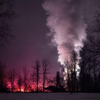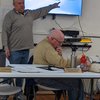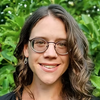Unexpected recognition and a golden pin, 22 years after 9/11
KNOX — Valerie Ackroyd was honored this week, along with throngs of other FBI workers, for her courage following the terrorists’ attacks on Sept. 11, 2001.
She and her husband, Ed Ackroyd, traveled from their Knox home to New York City — the first time she’d been there since the 9/11 attacks — for a Sept. 26 ceremony.
“It brought back a lot of memories,” she said.
Her husband said it was good for her to point out the places she had worked in the gruesome days following the al-Qaeda attacks and to see their restoration into monuments and productive spaces.
“I don’t talk to her or anybody about Vietnam,” said Ed Ackroyd, who joined the Army at age 17, “and she doesn’t talk to me about New York.”
“Today we gather to recognize the courageous men and women of the FBI for their contributions and service during the response, recovery and investigation in the aftermath of the terrorist attacks on September 11, 2001,” says a program from the ceremony. “These public servants distinguished themselves amid one of the most devastating attacks in U.S. history.”
Ed Ackroyd recalled watching television at home on that Tuesday morning in September 2001. “I saw the first plane hit, and then, when I saw the second plane hit, I called her at the office. She was in a meeting with the special agent in charge of the Albany office. They were all watching on TV. He said, ‘We’re going.’”
Valerie Ackroyd said the team from Albany was first sent to Fresh Kills, a huge landfill on Staten Island. “We sifted through everything that was brought in, on barges or tractor trailers. We were there 12 hours.”
She added, “During our 12 hours at the landfill, we did not have access to water, food, or facilities.”
The next day, she said, “We went over to Ground Zero; they supplied us with HEPA filters,” she said of high efficiency particulate air filters meant to make breathing amid all the dust and debris safe.
The Albany team worked from the command post on Vesey Street, she said, on 12-hour shifts.
“We went up all the buildings surrounding the Trade Center,” she said. “The power was off, of course.”
In the darkness, she would start on the first floor of a building where she would walk through dust and debris at least six inches deep, searching for human remains.
Without functioning elevators, she and the other FBI workers would climb to each floor until finally searching the rooftops.
How did she cope with such difficult work?
“You compartmentalize,” said Ackroyd. “You put it out of your head that you're looking for human remains. It’s a job. You have to do your job.”
Ackroyd did her job for two weeks, until another, fresh crew took over.
Life’s work
Valerie Ackroyd had been doing her job for the FBI for years when she was called to Ground Zero in 2001.
She had grown up in a small town in rural Lewis County in northern New York state. A school field trip to the nation’s capital her senior year of high school, in 1972, led her to apply to work for the FBI.
“I needed a job,” she said, and neighbors and friends were happy to provide references for her application.
“I didn’t go to college,” Ackroyd said, noting she had learned typing and data-processing in a BOCES program, which she believes landed her the job.
She moved to Washington, D.C. and began work at the National Crime Information Center. “We monitored vehicles that had been stolen ..,” she said. “We would send out teletypes to police departments from where they were from.”
After she transferred to the Albany office, Ackroyd said, “I started from the bottom, searching letters that came in with complaints or reporting a fugitive — agents would go out and search for them.”
When, at age 20, she was filling up at a gas station in Wynantskill, the man who pumped her gas and ran the station was Ed Ackroyd.
They have now been married for 47 years.
She took time off from her work at the bureau to raise their two sons — Darrel and Wade. Both sons, now grown, live nearby and Darrel, in Ballston Spa, has two children, Logan and Hadley.
Valerie Ackroyd retired in 2010 after 31 years with the FBI.
“Beautiful pin”
Being back at Ground Zero this past week, Ackroyd said, it looked “totally different.”
“They did a nice job,” she said of the monuments, noting the flowers people had left in remembrance.
“The new building is huge,” she said. “At the top of that, the light shines all the time.”
She went on, “It was pretty with trees all around; you wouldn’t know two other buildings had stood there at one time,” she said of the Twin Towers. “You wouldn’t know that people worked there and they’re gone now.”
Ackroyd said she had been surprised when she was invited to the ceremony. “None of us had been expecting any recognition because that was our job,” she said.
Christopher Wray presented each FBI worker with a commemorative pin.
He wrote in a letter, which Ackroyd plans to frame, “In the purest expression of service over self, you ran towards danger in the midst of chaos and uncertainty …. You gave your all at a time when you were needed most, asking for nothing in return.”
His letter goes on to recognize the colleagues who suffered from 9/11-related illnesses, and 26 who have since died are pictured in the program for the ceremony.
Ed Ackroyd took a picture of his wife with Director Wray — whom he called “a nice guy” — and proudly displayed her pin for The Enterprise.
The golden eagle pin incorporates a depiction of the Twin Towers, a shield in the shape of the Pentagon, and the Pennsylvania keystone — representing the planned targets of the terrorists’ hijacked planes; three planes met their mark while the fourth, headed for the Capitol, was foiled by a passenger revolt.
“It’s a beautiful pin,” said Valerie Ackroyd.



